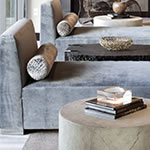Speaking about his company’s environmentally conscious development philosophy back in 1972, Myron P. Erkiletian said, “We developers are very anxious on a long term basis to work on ecology.” Some 40 years later, his family business continues to manifest this environmental ethic and quest for sustainability with the Tellus, a 16-story, 254-unit apartment building in the heart of Arlington, Virginia.
Erkiletian began his construction career at age 24, working on the now-infamous Watergate complex. In 1968, he started his own construction and development company with only $2,000. To date, the eponymous company has developed, built, and now owns more than 8,000 residential units, two million square feet of office space, and nearly one million square feet of commercial space in the Washington, DC, metropolitan area. Its projects include mixed-use residential communities and the Discovery Communications building in Silver Spring, Maryland.

With Zen-inspired interiors featuring subtle colors, natural wood, and stone finishes, the Tellus also offers electric vehicle-charging stations and bicycle parking for tenants.
Stefanie Erkiletian, who took over as Erkiletian’s president in 2004, works with her four brothers and 28-year company veteran Bill Denton within the ethical framework her father created: to develop, build, and invest in properties that define a region; to employ responsible and forward-thinking building and management practices; and to promote sustainable practices in harmony with the environment. “We look at this as a responsible approach to development,” Stephanie says. “My father was always environmentally sensitive. He believed in the urban core—locating apartments, offices, and retail buildings within high-density areas so you keep the country in the country and the city in the city.”
Erkiletian develops sites in neighborhoods along metropolitan DC’s urban corridors and near public transportation, razing or rehabbing neglected, outdated buildings. The Tellus, slated for occupancy this summer, replaces a circa-1960, seven-story office building near the Arlington Court House Metro station, rising above a vibrant mix of restaurants, offices, condos, and apartments. “Developing here follows the urban infill approach, where you create density around mass transit hubs and step it down as you enter surrounding neighborhoods. We know this market, and it’s a strong market, so the long-range plan is to focus our development efforts in this region,” says Denton, Erkiletian’s director of development.
Stefanie and the company’s development team continually challenge themselves to build on Myron’s vision. “Each time we go through a project, we try to outdo our own expectations in terms of optimizing sustainability,” she says.
The Tellus, on track for LEED Gold certification, incorporates natural design elements indoors and out. From the glass-walled lobby, residents glimpse the stepped courtyard plaza behind the building rising 12 feet above 14th Street to link the Tellus grounds to those of the building next door and creating 26,000 square feet of landscaped outdoor space. The courtyard’s Constellation Wall, a public art installation created by Erkiletian’s landscape designer in collaboration with a George Mason University astronomy professor, depicts a star map of the northern hemisphere in laser-cut cor-ten steel, back-lit to create the illusion of the night-time sky.
Building amenities include a rooftop pool and sundeck, outdoor terrace, fitness center, business center, and secure parking garage with electric-car-charging stations and bicycle parking. The Zen-inspired interior design features subtle colors, natural wood, and stone finishes to create the feeling of an urban oasis. All apartment units are equipped with energy-saving appliances and recycled countertops and carpet.
“My mother and father taught us about the importance of nature and making things last for future generations,” Stephanie says. “It’s been really nice to bring that forward into how we do business.”

